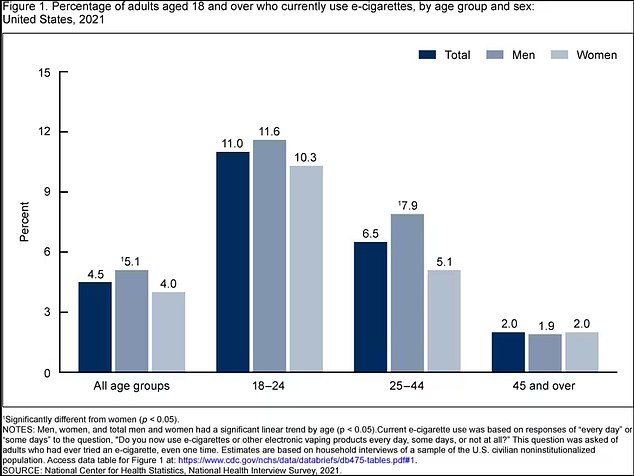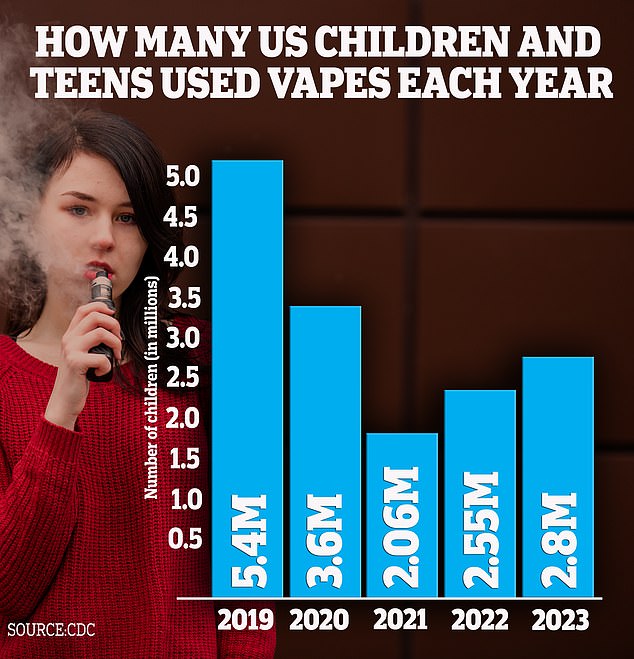Vaping, a habit shared by millions of Americans, is linked to depression, new research shows.
Australian researchers surveyed more than 5,000 students aged 12 to 14 about their mental health and e-cigarette use.
They found that students who reported severe depression were twice as likely to have tried vaping compared to those who reported no symptoms of depression.
Approximately 2 million American adults and 2.1 million children are addicted to e-cigarettes. Millions of adults try vaping each year in an attempt to quit smoking, but remain addicted to the devices.
Researchers cannot yet prove that vaping is a direct cause of depression and anxiety, only that there is an established link between them.
Millions of people try e-cigarettes as a way to deal with anxiety or depression and become addicted. Meanwhile, frequent vaping has been linked to mental health problems, including depression.
The graph shows tobacco use among adolescents, including vaping, which is the most widely used product among young people.

Around 2.8 million people under the age of 18 used tobacco products in 2023. Around 2.1 million of them used e-cigarettes.
Some 5,000 seventh and eighth grade students in Australian schools (aged 12 to 14) were surveyed as part of the University of Sydney research. OurFutures Vape Testwhich aims to prevent vaping in middle and high schools.
Students were asked about vaping, how often they vape, what they know about the harms of e-cigarettes, their motivations for using them, and whether they have experienced symptoms of depression in the past week.
Of the 5,157 total middle and high school students who participated in the survey, 8.3 percent reported having used an e-cigarette in the past.
Students who reported having moderate stress in their lives were 74 percent more likely to use e-cigarettes compared to those with lower stress levels.
Meanwhile, students who reported high levels of stress were 64 percent more likely to use e-cigarettes than those who did not have as much stress.
And students with low well-being, as measured by the survey’s standards, were 105 percent more likely to use e-cigarettes compared with those with high well-being.
Dr Lauren Gardner, one of the lead researchers behind the OurFutures trial, said: “Further research is needed to understand the complex relationship between mental health and vaping, however, these findings highlight the urgent need for evidence-backed prevention and early intervention approaches to support the short- and long-term health and wellbeing of young people.”
Their findings were published in the journal Australian and New Zealand Journal of Psychiatry.

About 4.5 percent of American adults of all ages vape regularly. That equates to more than 11.6 million people.
According to researchers, there is a growing body of research exploring the links between poor mental health and vaping use.
An American Heart Association study of 2,505 adolescents looked at the prevalence of anxiety and depression. among nicotine vapers.
The study found that 60 percent of nicotine-only and dual-vape users reported experiencing anxiety symptoms (such as worries, flashbacks, panic attacks, and situational anxieties) over the past week, compared with about 40 percent of participants who had never vaped.
Researchers have also found similar links between depression and vaping among adults.
A 2019 report in the Journal of the American Medical Association It has been shown that the more frequently adults use e-cigarettes, the greater their chances of suffering from depression.
Those who vaped daily were found to be 2.4 percent more likely to suffer from depression, while occasional users were 1.96 times more likely.
Meanwhile, a 2019 report in The Annals of Clinical Psychiatry looked at the effects of vaping on the mental health of young adults in college.
Those who used electronic cigarettes were significantly more likely have a mental health history of ADHD, PTSD, gambling disorder, and anxiety, report low self-esteem, and endorse traits of impulsivity.
About 4.5 percent of American adults, approximately 11.6 million people – are current users of electronic cigarettes.
In Australia, more than 14 percent of young people aged 15 years or older have tried or are currently vaping. Vaping appears to be a more popular activity among young people, including those who have never tried traditional cigarettes.
Meanwhile, in the United States, about 7.7 percent of students are current e-cigarette users. That translates to about 2.1 million kids, including 4.6 percent of middle school students and 10 percent of high school students, according to 2023 data, the latest available.
There is a glimmer of hope that private-sector and government-backed prevention measures are working. E-cigarette use among high school students declined in 2023 from just over 14 percent.
Dr Emily Stockings, co-principal investigator on the latest Australian research, said: ‘Although not explored in our study, it is possible that this relationship could be explained by shared social, environmental and genetic risk factors, or may indicate possible self-medicating behaviours.
‘Regardless of whether poor mental health influences smoking or vice versa, it is clear that if we want to prevent the emergence of vaping, we need to address mental health at the same time.’


